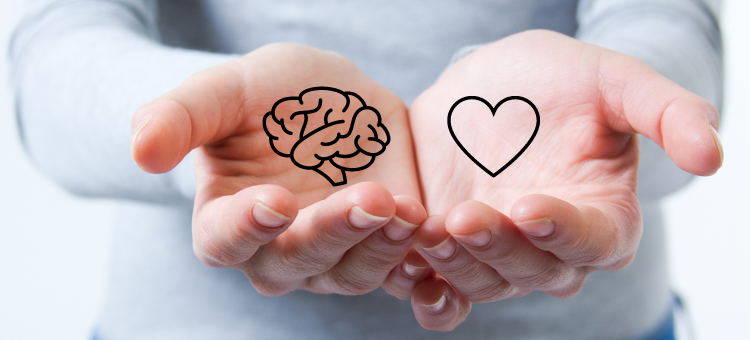Relationship Between Mental Health and Physical Health

The World Health Organization (WHO) found that during the first year of the pandemic, the number of people dealing with anxiety and depression around the world increased by about 25%. This increase was most noticeable among women, younger adults (ages 20-24), and those living in low- and middle-income countries.
To truly understand why mental health problems are on the rise, we need to grasp the connections between our mental and physical well-being. Even though mental health is still a relatively new area of medical study, we are discovering that our mental and physical health are closely connected. Mental health issues don’t just affect our minds; they impact our overall health, including our physical, behavioral, and social well-being.
Research has shown that people who regularly exercise tend to have better mental and emotional health, as well as lower rates of mental illnesses. Engaging in physical activity appears to reduce the risk of developing mental health problems and can be beneficial in treating conditions like depression and anxiety. In fact, for mild to moderate depression, exercise can be just as effective as antidepressant medications or psychological treatments like cognitive behavioral therapy. Exercise can be a helpful part of various treatment options.
It’s really important to keep both your body and mind healthy for a good, long life. That means doing things to move your body every day, like exercising or playing sports. You can also keep track of what you eat and how much to make sure you’re staying at a good weight with TDEE calorie calculator. Taking care of yourself this way is good for your overall well-being. This article explores some of the key aspects of the relationship between mental and physical health and what it means for you.
Mind-body Connection History
Hippocrates, the first doctor, recognized the connection between our minds and bodies. Since then, experts have learned a lot about how these two parts of us are linked.
Dr. Cruz explains, “Your thoughts and feelings start in your brain, but you have receptors all over your body. That’s why you might feel them in your stomach or elsewhere in your body.”
For instance, when you’re nervous, you might get butterflies in your stomach. If you’re scared, you could experience shortness of breath. Feeling pressure might lead to tightness in your neck or back. These are just a few examples of visible signs that can happen because of what’s going on in your mind.
How Mental Health Affects Physical Health
The gap between physical and mental health isn’t as big as it seems. For a long time, scientists have been trying to figure out how our physical health affects our mental health, and the other way around. The answer is a bit tricky, but we do know that mental health issues can affect our physical health in different ways. Let’s explore some clear ways that your body and mind can affect each other.
1. Depression and the Immune System
Feeling sad or down can do more than just affect your mood. It turns out that depression, which is a condition where someone feels really sad for a long time, can also have an impact on the immune system. The immune system is like the body’s defense team that fights off germs and keeps us healthy.
When someone is dealing with depression, it seems to affect the way their immune system works. It might make the immune system not work as well as it should, making it a bit harder for the body to fight off illnesses. So, taking care of mental health is not just about feeling better emotionally; it can also help the body stay strong and healthy.
2. Mental Illness and Fatigue
Experiencing mental health challenges can go hand-in-hand with feeling tired or exhausted. Mental illness, such as anxiety or depression, can contribute to feelings of fatigue. It’s not just about emotional well-being; mental health can affect physical energy levels too. Understanding and addressing mental health can be key to managing and reducing fatigue associated with mental illness.
3. Anger, Anxiety and Heart Health
Strong feelings like anger and anxiety can have an impact on your heart health. When these emotions are frequent or intense, they may contribute to problems like high blood pressure or other heart issues. Taking steps to manage and cope with anger and anxiety is not only good for your mental well-being but can also be beneficial for keeping your heart healthy.
4. Chronic Diseases
Chronic diseases are long-term health conditions that persist over an extended period, often for a person’s lifetime. These conditions may require ongoing medical attention, management, and lifestyle adjustments. Examples of chronic diseases include diabetes, hypertension (high blood pressure), heart disease, arthritis, and certain types of cancer. Managing chronic diseases typically involves a combination of medication, lifestyle changes, and regular medical monitoring to enhance quality of life and minimize complications.
5. Sleep Quality
Sleep quality refers to how well you sleep and how satisfied you are with it. It’s not just about duration but also how restful and refreshing your sleep is. Good sleep is crucial for physical and mental well-being, supporting cognitive function and emotional health. Poor sleep can lead to issues like fatigue and mood disturbances. Creating a conducive sleep environment and adopting healthy sleep habits are key for better sleep quality.
6. Digestive Health
Digestive health refers to the well-being of the digestive system, which includes the stomach, intestines, and other related organs. It involves the efficient breakdown and absorption of nutrients from the food we eat. A healthy digestive system contributes to overall well-being by supporting nutrient absorption, immune function, and energy production. Adopting a balanced diet rich in fiber, staying hydrated, and incorporating probiotics can positively impact digestive health. Maintaining a healthy lifestyle, managing stress, and getting regular exercise also contribute to optimal digestive function.
7. Life Expectancy
Life expectancy is the average number of years a person is expected to live based on various demographic factors, health conditions, and historical data. It provides an estimate of how long a person born in a specific year is likely to live, on average. Life expectancy is influenced by factors such as genetics, access to healthcare, socio-economic conditions, lifestyle choices, and environmental factors. Improvements in healthcare, sanitation, and living conditions have generally led to increases in life expectancy over time.
Tips to Improve Mental Health
- Take time for activities you enjoy, practice self-compassion, and set boundaries to manage stress.
- Establish a consistent sleep routine to enhance both the quantity and quality of your sleep.
- Engage in practices such as deep breathing, meditation, or yoga to promote relaxation and reduce stress.
- If needed, consult with mental health professionals for support, therapy, or medication tailored to your needs.
Tips to Improve Physical Health
- Set clear schedules for screen use to balance technology with other activities.
- Teach about nutritious food choices to establish healthy eating habits from a young age.
- Encourage physical activity through enjoyable exercises or sports to maintain overall fitness.
- Minimize or eliminate the use of alcohol and drugs to support a healthier lifestyle and well-being.
Conclusion
In conclusion, prioritizing both mental and physical health is essential for overall well-being. Adopting self-care practices, ensuring adequate sleep, and exploring relaxation techniques contribute to improved mental health. Simultaneously, managing screen time, educating about healthy eating, promoting regular exercise, and avoiding substances like alcohol and drugs are crucial steps for enhancing physical health. A holistic approach that addresses both mental and physical aspects creates a foundation for a healthier and more fulfilling life. Remember, small, consistent efforts in these areas can lead to significant positive changes in your overall health and happiness.
Helpful Resources
How Does Mental Health Affect Physical Health?
The Role of Calories in Weight Loss: Quality vs. Quantity
The Connection Between Mental Health and Physical Health
Can Coffee Increase Your Metabolism and Help You Burn Fat?
Dieting and Low Calorie Diet for Diabetic Patient










This article excellently highlights the intricate link between mental and physical health, emphasising the importance of holistic well-being. A must-read for anyone interested in improving their overall health!
This article excellently highlights the intricate link between mental and physical health, emphasizing the importance of holistic well-being. A must-read for anyone interested in improving their overall health!